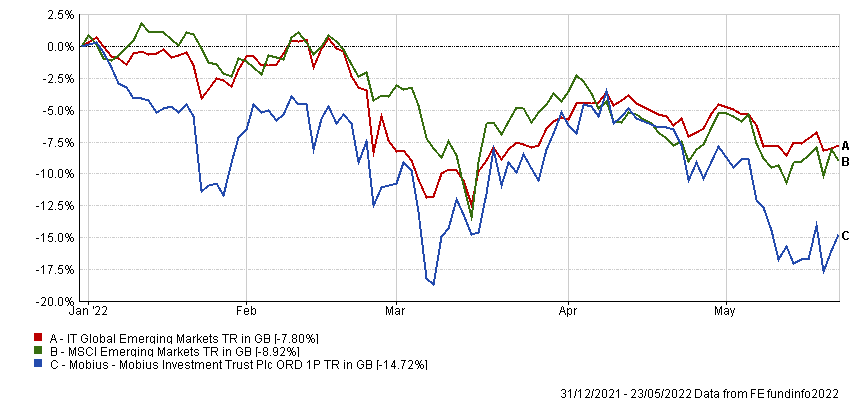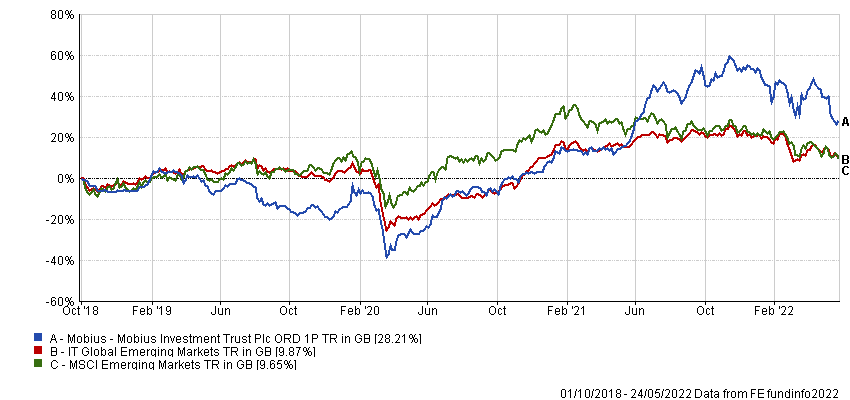It is currently difficult to say anything positive about emerging markets, according to Carlos Hardenberg of Mobius IT, who said he has rarely encountered a more difficult period since he started his career in 1999.
Yet the manager claimed it will still be possible to make money from the sector, so long as you are “mindful about the neighbourhood in which you build your house”.
Hardenberg has avoided most of the major disasters in emerging markets this year – he had nothing in Russia, and his exposure to China is limited to one Hong Kong-listed healthcare provider.
Yet neither does he have any exposure to financials, the largest component of the MSCI Emerging Markets index and one of its best performers so far in 2022. The manager has also suffered from general pessimism towards the sector, and his trust is down 14.7% this year, compared with losses of 7.8% from its IT Global Emerging Markets sector and 8.9% from the MSCI Emerging Markets index.
Performance of trust vs sector and index in 2022
Source: FE Analytics
However, Hardenberg was confident his safety-first strategy will help see him through this difficult period, even though he focuses on the more volatile small- to mid-cap area.
“We hate to lose money, especially when it's our own,” he said. “So we do two things. First, we carefully select those businesses where we find quality, where we find a unique business model that is backed by the right capex structure.
“We don’t invest in leveraged plays. We've learned that lesson in Brazil, in Turkey and in Asia, time and time again.
“As Warren Buffett said, when the tide goes out, you can see who is swimming naked. We have actually delivered very good performance over the last four years.”
The second part of Hardenberg’s strategy involves taking a top-down view, which led him to avoid Russia and China, as well as Argentina, Bangladesh, Pakistan and sub-Saharan Africa, due to macroeconomic and governance concerns about these regions.
“It's a risk that you cannot have in a 25-stock portfolio,” he continued. “And it's also a result of our own experiences – you may be lucky in certain periods, but overall you have to be mindful about the neighbourhood in which you build your house.”
With this in mind, it may come as a surprise that Taiwan makes up the largest regional exposure in the trust, at 23.5%. There have been concerns that, like Ukraine, the East Asian country could get invaded by a much larger neighbour and, while Hardenberg claimed Taiwan and China are “now getting together in a more civilised fashion”, the latter still views the former as part of its territory and said it would use force as a last resort for what it called “reunification”.
Yet Hardenberg said investing in Taiwan was worth the risk.
“Taiwan is really providing us with an ecosystem of businesses that are global. They're everywhere: in the US, Europe and the UK,” he added. “We’re invested in the leading provider of solar energy technology in Asia. We're invested in a global leader in providing sensor technology to produce automobiles, iPads, AirPods, and all the rest of it.
“And that is a segment that is expected to grow further. The technology knowhow is unique with deep moats, so they also have the ability to benefit from this inflationary environment.”
Hardenberg said this reflects the biggest shift in emerging markets since he started running money in the sector. Back then, it was all about banks, breweries, telecoms and commodities.
Now though, the focus in emerging market economies is on tech – this is backed up by statistics, with more patents registered in Asia each year than the US.
Hardenberg is seeing anecdotal evidence of this, too.
“Having lived in emerging markets for most of my life, I noticed families with an entrepreneurial background would send their children away to the US, UK or Europe to study, and many of them stayed there, but there's been a big reversal,” he said.
“You have better universities, better education, and much more sophisticated services.
“And of course, they are developing their own products. For the first time, the supply chains of numerous global industries are dominated by components developed in emerging markets, not because they're cheap, but because they are as good or even better [than those made in the West].
“If you look at the components in a Tesla car, about 90% are actually developed and produced in Taiwan, Korea or elsewhere in Asia.”
Looking forward, Hardenberg said the worst of the supply-chain shortages and the knock-on impact on inflation may be yet to come. On the plus side, he said China has recognised this threat and is taking action to stimulate its economy, introducing policies such as lower mortgage rates and bank reserve requirements, with “a lot more to come in the second half of this year”.
Nonetheless, he still has no plans to increase his exposure to the region.
“What worries me the most is governance and the quality of accounts and managers,” he finished.
Hardenberg’s view is echoed by Jason Pidcock, manager of the Jupiter Asian Income fund, who recently told Trustnet that China is likely to rebound in the second half of the year – but he has next to no exposure to this market.
Mobius IT has made 28.2% since launch in October 2018, compared with 9.9% from its sector and 9.7% from its benchmark.
Performance of trust vs sector and index since launch

Source: FE Analytics
The trust has ongoing charges of 1.5% and is on a discount of 2.3%.






